

Forceful Let-down (Milk Ejection Reflex) & Oversupply. By Kelly Bonyata, BS, IBCLC Is forceful let-down the problem?
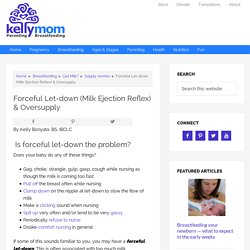
Does your baby do any of these things? Gag, choke, strangle, gulp, gasp, cough while nursing as though the milk is coming too fastPull off the breast often while nursingClamp down on the nipple at let-down to slow the flow of milkMake a clicking sound when nursingSpit up very often and/or tend to be very gassyPeriodically refuse to nurseDislike comfort nursing in general If some of this sounds familiar to you, you may have a forceful let-down. This is often associated with too much milk (oversupply). What can I do about it? There are essentially two ways you can go about remedying a forceful let-down: (1) help baby deal with the fast flow and (2) take measures to adjust your milk supply down to baby’s needs.
Help baby deal with the fast milk flow Position baby so that she is nursing “uphill” in relation to mom’s breast, where gravity is working against the flow of milk. Spitting Up & Reflux in the Breastfed Baby. By Kelly Bonyata, BS, IBCLC © Paul Hakimata – Fotolia.com My baby spits up – is this a problem?
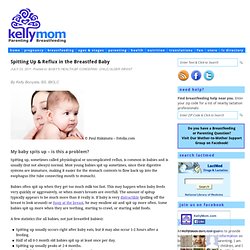
Spitting up, sometimes called physiological or uncomplicated reflux, is common in babies and is usually (but not always) normal. Most young babies spit up sometimes, since their digestive systems are immature, making it easier for the stomach contents to flow back up into the esophagus (the tube connecting mouth to stomach). Babies often spit up when they get too much milk too fast. A few statistics (for all babies, not just breastfed babies): Spitting up usually occurs right after baby eats, but it may also occur 1-2 hours after a feeding.Half of all 0-3 month old babies spit up at least once per day.Spitting up usually peaks at 2-4 months.Many babies outgrow spitting up by 7-8 months.Most babies have stopped spitting up by 12 months.
Some causes of excessive spitting up My older baby just started spitting up more – what’s up? If baby does not seem ill, then here are some possible causes: Breastfeeding your baby with acid reflux. We are proud to announce that Laura Barmby's booklet, Breastfeeding Your Baby with Reflux, is now available for free.
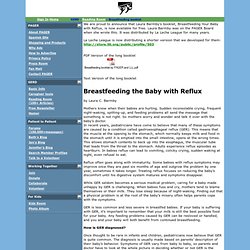
Laura Barmby was on the PAGER Board when she wrote this. It was distributed by La Leche League for many years. La Leche League is now distributing a shorter version that we developed for them: PDF Version of the long booklet Text Version of the long booklet. Breastfeeding boosts babies’ growing brains, imaging study finds. A study using brain images from “quiet” MRI machines adds to the growing body of evidence that breastfeeding improves brain development in infants.
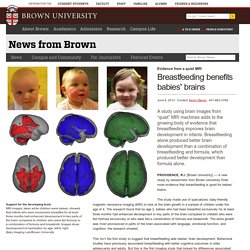
Breastfeeding alone produced better brain development than a combination of breastfeeding and formula, which produced better development than formula alone. PROVIDENCE, R.I. [Brown University] — A new study by researchers from Brown University finds more evidence that breastfeeding is good for babies’ brains. The study made use of specialized, baby-friendly magnetic resonance imaging (MRI) to look at the brain growth in a sample of children under the age of 4. The research found that by age 2, babies who had been breastfed exclusively for at least three months had enhanced development in key parts of the brain compared to children who were fed formula exclusively or who were fed a combination of formula and breastmilk. Why Nighttime Breastfeeding So Important. It’s an evolutionary trait that moms are wired to be responsive to their baby’s cries.
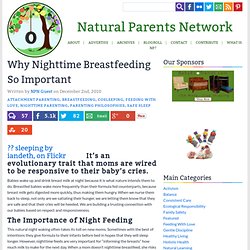
Babies wake up and drink breast milk at night because it is what nature intends them to do. Breastfed babies wake more frequently than their formula fed counterparts, because breast milk gets digested more quickly, thus making them hungry. When we nurse them back to sleep, not only are we satiating their hunger, we are letting them know that they are safe and that their cries will be heeded. We are building a trusting connection with our babies based on respect and responsiveness. The Importance of Night Feeding This natural night waking often takes its toll on new moms. Prolactin. Nutritional Benefits of Breastfeeding Toddlers: Extended Nursing Aids Nutrition and Reduces Illness and Allergies. As more women in North America are breastfeeding to a year and beyond, they may wonder if the benefits of breastfeeding extend to their toddler, or if breastfeeding is just good for babies.
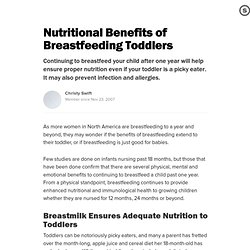
Few studies are done on infants nursing past 18 months, but those that have been done confirm that there are several physical, mental and emotional benefits to continuing to breastfeed a child past one year. From a physical standpoint, breastfeeding continues to provide enhanced nutritional and immunological health to growing children whether they are nursed for 12 months, 24 months or beyond. Breastmilk Ensures Adequate Nutrition to Toddlers Toddlers can be notoriously picky eaters, and many a parent has fretted over the month-long, apple juice and cereal diet her 18-month-old has embarked upon. While most toddlers do eat a balanced diet when offered healthy choices, breastfeeding your toddler can help to alleviate some of the worry about toddler nutrition. According to a study by Kathryn G. La Leche League GB - mother to mother support for breastfeeding. The Infant Feeding Trust. Little Angels. The Breastfeeding Network. LLLI.
Breastfeeding Today. Breastfedbabies.org.